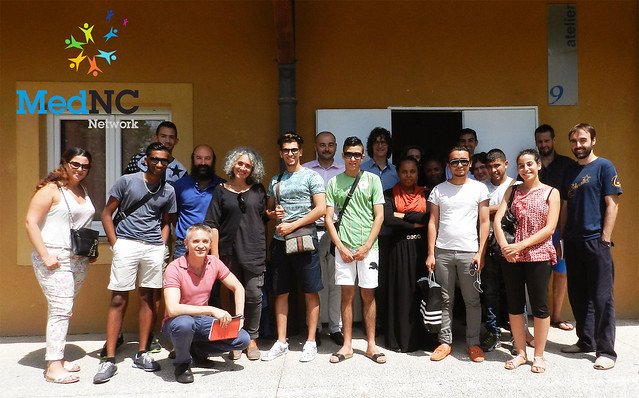
Mediterranean New Chance (MedNC)
Context and objectives
The Mediterranean New Chance (MedNC) project addresses the socio-professional integration of young people, particularly of those who are not in education, employment, or training (NEET). It does this by strengthening cooperation among stakeholders, in particular second chance schools.
The project, part of the Mediterranean Initiative for Jobs (Med4Jobs), is coordinated by the European Institute for Cooperation and Development (IECD). It is currently being implemented in Algeria, Egypt, France, Italy, Jordan, Lebanon, Morocco, Portugal, Spain and Tunisia through capacity-building activities and the exchange of innovative education experiences and best practices among partners.
MedNC’s mission is based on three pillars:
- Bringing together a network of stakeholders working towards the socio-professional integration of young people in the Mediterranean region.
- Promoting capacity-building activities and stimulating innovation.
- Improving the socio-professional integration of young people, in particular of NEETs and young women.
Location

Key figures
Started:
2015
Countries:
10
Beneficiaries:
+55k students, as of 2023
Educational centres
100
Med4Jobs
MedNC is part of the Mediterranean Initiative for Jobs (Med4Jobs), a cross-sector, region-wide initiative in the field of job creation. The initiative was developed by the UfM Secretariat to help increase the employability of young people and women, close the gap between labour supply and demand, and foster a culture of entrepreneurship and private-sector development.
Promoter
Mediterranean New Chance (MedNC) is promoted by the European Institute for Cooperation and Development (IECD), which took over the regional coordination of the project on the 1st of January 2018.
Founded in 1988, the IECD is a French organisation that implements over 50 development projects in 15 countries in cooperation with local partners. For the past 30 years, the IECD has developed expertise in four key areas: Education; Vocational Training and Youth Employability; Support to Small Enterprises; and Healthcare.
Other promoters and local partners
- Al Jisr Association
- Alexandria Business Association
- Drosos Foundation
- French Agency for Development
- French Chamber of Commerce and Industry in Egypt
- L’Heure Joyeuse
- Municipality of Matosinhos
- Network of Second Chance Schools in France
- New Chance Tunisia Association
- Sales School Miftah Ennajah Semeurs d’Avenir
- Spanish Association of Second Chance Schools
- Foundation Apprentis d’Auteuil
- Tunisian Association for Management and Social Stability
- SELA for training and protection of the heritage
- AE2O – Associação para a Educação de Segunda Oportunidade
- RAFIQ E2C
- Ftartchi
Beneficiaries
As of 2023, MedNC has proven the significance of its work by providing support to over 55,000 young people, uniting more than 340 schools and centres across 10 Mediterranean countries.
Key actions
- Bringing together public, private and civil society actors involved in the socio-professional integration of young people in order to learn from one another.
- Supporting the exchange of experience and knowledge between education, training and youth organisations on the one hand, and the members of the network on the other.
- Sharing feedback and experiences in order to design and implement best practices.
- Developing quality assurance through the creation of specific accreditation.
Results
Egypt: Creation of a second chance school in Alexandria.
Spain: Establishment of a national network of second chance schools.
France: Implementation of new programmes at the Second Chance School of Marseille.
Morocco: Implementation of a customised teaching method at the OCP Foundation’s Skills Centres and support for the creation of an orientation centre in the Greater Casablanca region.
Tunisia: Establishment of a new chance facility at public universities.

